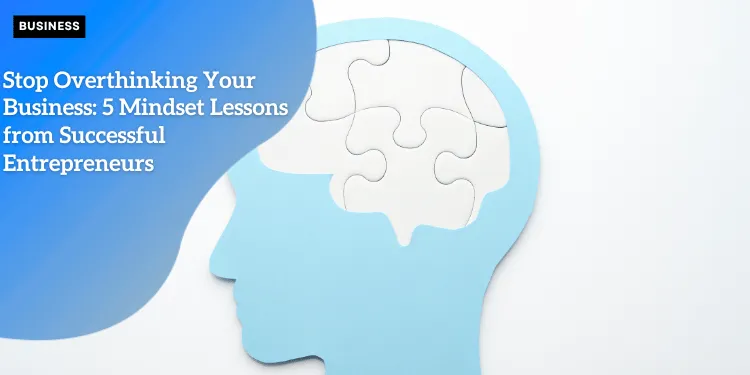Stop Overthinking Your Business: 5 Mindset Lessons from Successful Entrepreneurs

Anúncios
How Excessive Intelligence Can Lead to Analysis Paralysis
Being smart is often regarded as an asset, but having excessive intelligence can sometimes lead to analysis paralysis.
This occurs when highly intelligent individuals overanalyze every decision to avoid making mistakes.
Instead of moving forward, they get stuck in an endless loop of thinking and rethinking possibilities.
As Corey Wilks points out, intelligent people are adept at solving problems, but the infinite number of problems can leave them paralyzed with choices, ultimately stifling progress.
Anúncios
 Lessons from Successful Entrepreneurs
Lessons from Successful Entrepreneurs
Why Successful Entrepreneurs Often Aren’t the Highest IQ Individuals
Interestingly, many highly successful entrepreneurs do not have the highest IQs.
Instead, they possess a different type of intelligence—practical and adaptive.
These entrepreneurs are typically good at taking action and learning from their results, rather than striving for perfection right from the start.
Anúncios
Plenty of individuals with average intelligence outperform their smarter counterparts because they avoid overthinking and are quick to experiment and iterate their strategies.
The Power of Action Over Perfect Planning
The true strength in entrepreneurship lies in the power of action. Successful business builders know that perfect planning is an illusion.
They understand that the real insights come from acting, making mistakes, and adapting.
This action-first mindset is what sets them apart.
By continually moving and adjusting as necessary, they are able to overcome obstacles and seize opportunities that might be missed by those waiting for the perfect plan to materialize.
Transitioning from a mindset of overthinking to one of taking action can be transformative.
Recognizing the hidden cost of being too smart is the first step towards breaking free from self-imposed barriers.
Breaking Free from Self-Imposed Barriers
Entrepreneurs face numerous mental hurdles that can hinder their progress.
Among the most common are perfectionism, doubt, and fear. These self-imposed barriers often originate from our own limiting beliefs.
While it’s easy to blame external circumstances, the reality is that much of what holds us back is internal.
Perfectionism
Perfectionism is the unrelenting drive to meet impossibly high standards—a common trap among smart individuals.
This can lead to analysis paralysis, where the need to make the perfect decision prevents any decision from being made.
Corey Wilks, a business coach and former psychologist, emphasizes that perfect planning is illusory, and excessive intelligence can actually be a hindrance due to overthinking.
Doubt and Fear
Doubt often manifests as a second-guessing of one’s abilities and the value of one’s ideas.
It’s closely linked to the fear of failure and judgment.
Entrepreneurs might avoid launching a product because they fear criticism or failure, thus missing out on valuable learning experiences.
Wilks addresses these mental hurdles by helping business owners confront their limiting beliefs and clarifying what truly matters.
It’s a process of identifying where the disconnect lies between one’s goals and actions.
Limiting Beliefs
Limiting beliefs are false notions we hold about our abilities and worth.
Entrepreneurs frequently believe that they lack the necessary resources, intelligence, or experience to succeed.
However, these are often just excuses masking a deeper fear of stepping out of one’s comfort zone.
As Wilks points out, the real obstacle is often our internal narrative.
We tell ourselves that we aren’t smart enough or well-prepared, but in reality, it’s our mindset holding us back.
External vs. Internal Blocks
The misconception that external circumstances are primarily what hold us back is widespread.
In truth, it’s more about our internal barriers.
While external obstacles like financial constraints or market conditions do play a role, they’re often surmountable with the right mindset.
Wilks’ own journey underscores this, as he transitioned from being a psychologist to a business coach by learning new skills and leveraging his network.
Recognizing the distinction between actual limitations and self-imposed ones is crucial for entrepreneurial growth.
Breaking free from these barriers is about embracing an actionable mindset. By focusing on forward movement rather than perfection, entrepreneurs can unlock their potential.
This shift empowers you to learn from your actions and iterate as you go along.
Confronting and overcoming these mental hurdles can be liberating, setting the stage for genuine growth and success in your entrepreneurial journey.
The Action-First Mindset
Embracing an action-first mindset is crucial for entrepreneurial success.
It’s the antithesis of perfectionism, focusing on taking immediate steps rather than being paralyzed by over-analysis.
Many successful entrepreneurs attribute their achievements not to having the highest IQ, but to their ability to take action quickly and effectively.
Why Starting and Iterating Beats Endless Planning
Endless planning often leads to analysis paralysis, where overthinking prevents action.
The most effective entrepreneurs recognize that the perfect plan does not exist.
They focus on starting small, testing their ideas, and iterating based on feedback.
This approach allows them to make progress, learn from real-world results, and adjust their strategies accordingly.
The concept of starting and iterating can be illustrated by Corey Wilks’ experience.
Despite the challenges he faced, Wilks pivoted from psychology to business coaching, emphasizing quick action and continuous learning.
“I produce valuable content to help folks attract friends and customers. Just start and then iterate,” Wilks advises
How Successful Entrepreneurs Approach Problem-Solving
Successful entrepreneurs approach problem-solving with a bias towards action.
Instead of getting bogged down by complications, they identify the core of a problem and take the first steps to address it.
This iterative process is less about achieving perfection and more about gradual improvement.
Corey Wilks highlights the ability of smart entrepreneurs to solve problems effectively without overthinking.
“Intelligence beyond a certain point can be a hindrance because you overthink everything.
Entrepreneurship is about identifying problems and solving them, not getting paralyzed by too many potential issues”.
The Importance of Taking Imperfect Action
| Key Concept | Explanation |
|---|---|
| 🚶♂️ Imperfect Action | Successful entrepreneurs understand that taking imperfect action is better than waiting for the perfect moment, as it leads to progress and learning. |
| 📊 Learning from Mistakes | Every step, even if flawed, provides valuable insights that help refine future decisions and actions. |
| 💼 Wilks’ Example | Wilks transitioned from clinical psychology to business coaching by taking imperfect action, building a thriving coaching business despite challenges. |
| 💡 Action-First Mindset | Focusing on action over perfection helps entrepreneurs move beyond internal barriers, laying the groundwork for continuous growth. |
| 🌱 Unlocking Potential | By adopting an action-first mindset, entrepreneurs can unlock their full potential and drive their ventures forward. |
Reframing Success and Failure
Moving Past the Fear of Judgment and Criticism
Fear of judgment can be one of the most paralyzing aspects for budding entrepreneurs.
It’s natural to fear how others perceive your failures, but allowing this fear to dictate your actions is a surefire way to remain stuck in a cycle of stagnation.
Successful entrepreneurs understand that not everyone will support or understand their vision – and that’s okay.
To move past this fear, it’s essential to shift your focus from external validation to internal fulfillment.
Focus on the value you’re creating and the progress you’re making rather than the fleeting opinions of others.
Corey Wilks, a business coach specializing in mindset, emphasizes that identifying and overcoming these limiting beliefs is crucial.
By tackling these mental hurdles head-on, you give yourself the freedom to take risks without being paralyzed by the fear of judgment.
Why Personal Narratives Matter in Business Success
Your personal narrative – the story you tell yourself – plays a monumental role in shaping your business success.
Positive narratives can propel you forward, while negative ones can hold you back.
If you see yourself as someone capable and resilient, you’re more likely to take risks and persevere through challenges.
Conversely, if you dwell on past failures or succumb to self-doubt, you might find yourself hesitant and unsure.
Wilks points out that many entrepreneurs struggle with self-doubt and perfectionism, often blaming external factors like lack of resources or money for their lack of progress.
However, these are typically excuses veiling deeper internal blocks.
Embracing a narrative of growth, where mistakes are seen as learning opportunities rather than setbacks, can transform your approach to business.
How to Build Confidence Through Small Wins
Building confidence doesn’t require monumental achievements from the get-go. In fact, it starts much smaller – through consistent small wins.
These small wins accumulate, creating a sense of progress and accomplishment that boosts your overall confidence.
Start by setting manageable goals. When you achieve these, acknowledge and celebrate them.
This creates a positive feedback loop, encouraging you to set and accomplish more ambitious targets over time.
Each win, no matter how small, is a step towards building the confidence needed to take on larger challenges.
Wilks’ own journey from a psychologist to a business coach showcases this process.
He faced his own crossroads and had to build his skillset anew, one step at a time, leveraging resources and seeking support from his network.
By focusing on actionable steps and celebrating small wins, he developed the resilience and confidence to thrive in his new role.
This chapter highlights the importance of reshaping both internal narratives and daily actions.
By refocusing on personal progress and small achievements, entrepreneurs can dismantle the fear of failure and criticism, setting the stage for long-term success.
Creating a Path Forward
Overcoming analysis paralysis and taking decisive action are essential steps for any entrepreneur.
It’s not enough to recognize the problem—you need practical strategies to push through the inertia and create a forward momentum.
Here’s how to tame the overthinking beast and move your business forward.
Practical Steps to Overcome Overthinking in Business Decisions
First, simplify your decision-making process. Break large tasks into smaller, manageable steps.
This makes the process less daunting and provides a clear direction.
Use frameworks like the Eisenhower Matrix to prioritize tasks based on urgency and importance. Also, set a timer when making decisions to force yourself into action.
The Pomodoro Technique can be a useful tool, where you work on a task for 25 minutes and then take a 5-minute break.
Leveraging Available Resources and Information
Information is abundant and often free. Leverage online courses, podcasts, and webinars to enhance your skills and knowledge.
Sites like Coursera and Udemy offer valuable courses tailored for entrepreneurs.
Don’t hesitate to seek advice from mentors through platforms like LinkedIn or local business networks.
Use tools like Google Trends to understand market demands and read industry reports to discover new opportunities.
Building a Support Network for Entrepreneurial Growth
Networking is more than just building a contact list; it’s about creating a supportive community.
Join local business groups, attend industry events, and engage in online forums.
Corey Wilks’ journey from psychologist to business coach underscores the importance of these connections.
When faced with obstacles, peers can offer new perspectives and solutions.
A robust support network not only provides emotional encouragement but also opens doors to collaborations and partnerships.
By breaking tasks into smaller steps, effectively utilizing resources, and building a strong support network, you can conquer overthinking and foster a more action-oriented mindset.
This strategic approach paves the way for continued growth and resilience.
